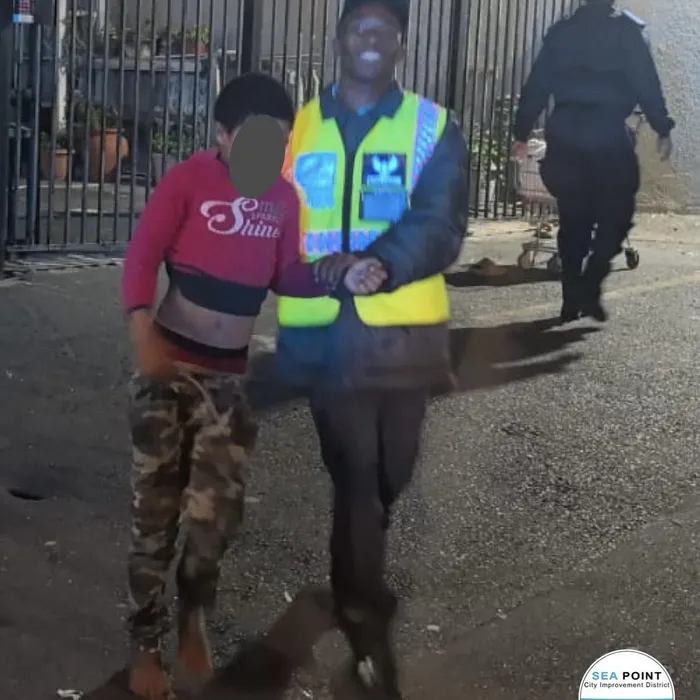Sea Point residents alarmed by rising aggression among street children

Street children is a concern along the Atlantic Seaboard strip.
Image: CID
The Sea Point City Improvement District (CID) has appealed to Mayor Geordin-Hill Lewis, Police Oversight and Community Safety, and Social Development to assist with 'aggressive' street children, with 'untouchable' attitudes. They have requested the formation of a task team.
Activists suggest that there are 800 children roaming the streets of Cape Town, and according to the City's census report of 2022, it said there were 6600 people sleeping on the streets.
Earlier this year, Sea Point CID confirmed that together with the Department of Social Development (DSD), they removed more than ten children from the streets within a week.
On Thursday, MEC for DSD, Jaco Londt said following interventions with the CID for the past year had seen a total of 39 children being removed off from the streets between April 2024 to March 2025, one of whom was in contact with the law and an additional 19 from April 1 2025 to September 30.
Jacques Weber, Chairman of the Sea Point CID, said the situation was dire as residents continued to live in fear.
“In September 2024, Sea Point CID COO, Heather Tager, and I met with Minister Jaco Londt, the Western Cape MEC for Social Development, to address the growing concern of aggressive street children operating within the Atlantic Seaboard area,” he said.

Sea Point CID has worked helping removing street children off from the streets and placing them into homes.
Image: CID
“What we are witnessing across Sea Point is deeply troubling. These children have become increasingly aggressive, and in some cases, violent.
"Many residents have shared their fears and frustrations, and I share them wholeheartedly. It is evident that these children believe themselves to be “untouchable” and, in practice, that seems to be the reality.”
Weber called on a specialised task team.
“Due to a severe shortage of social workers, these joint operations can only take place every couple of weeks, and when they do, the same cycle repeats itself: a child is removed from the street by a social worker, only to return hours or days later,” he added.
“What is needed is a dedicated, daily task team made up of mandated individuals, including social workers and peace officers, who can respond to and manage these situations continuously and effectively.
“Today alone, there were two violent altercations between groups of these children. On other days, they are seen aggressively begging at intersections, notably at Beach Road and St John’s Road, or demanding money from motorists,” he said.
He then called on role players to remedy their concerns: "I have again written formally to Minister Jaco Londt (Social Development), Minister Anroux Marais (Community Safety and Police Oversight), Mayor Geordin Hill-Lewis, Alderman JP Smith, and Ward Councillor Nicola Jowell.
"The situation has reached a point where inaction is no longer an option; it is now a matter of public safety, economic impact, and community well-being.”
Londt added that their social workers have a large case load.
“We have also made it clear to the CID, that our social workers have significantly high caseloads they deal with, and that due to limited resources, our department cannot allocate a dedicated social worker to the Sea Point area to only deal with the children” he added.
“Our department will look into holding a workshop in the coming weeks on the Children’s Act, where stakeholders, like the Sea Point CI, can give inputs into the process currently underway in the National Parliament to amend the national legislation.
Activist, Venecia Orgill, known as the “Angel of the Garden,” because she feeds the homeless at the Company Gardens in Cape Town said the solution was creating a centre for street kids aimed at drug abuse.
"This was addressed by myself with Albert Fritz when he was in office for social development,” she said.
“I suggested a centre for children from 13 to 18-years-old, even younger because sniffing glue on the streets is drugging, we cannot call it anything else.
“This is what we need to address, yet there is no home for kids addicted to street drugs like dagga, mandrax, tik and glue, that is under the age of 18 as rehabilitation only starts with 18 and older.
Western Cape Provincial MEC of Police Oversight and Community Safety Anroux Marais said: "From a legal and procedural perspective, it is important to note that the South African Police Service (SAPS) and law enforcement agencies can only act when minors are engaged in criminal activity and in conflict with the law. In such instances, cases are dealt with on an individual basis, in line with the Children’s Act and other applicable legislation. Simply being on the streets does not, in itself, constitute a crime.
However, the reality is that without the ability to place these children in secure care facilities, which are currently over-subscribed, it is exceedingly difficult to permanently monitor kids who have been taken off the streets and return.
I will engage the Children`s Commissioner, the City of Cape Town and the local SAPS to ascertain what additional steps can be taken, both in the best interests of the children and in the interest of public safety," Marais said.
"Matters involving children in need of care and protection, as defined in the Children’s Act (Act 38 of 2005), fall under the statutory responsibility of the Western Cape Department of Social Development (DSD), said Mayoral Committee Member for Community Services and Health, Francine Higham
"In line with our protocol agreement, such cases are referred to the Provincial Department, as the City of Cape Town does not have a statutory mandate to intervene directly in these situations. We recognise the seriousness of the situation on the Atlantic Seaboard and the deep concern it has caused among residents."
Get your news on the go, click here to join the Cape Argus News WhatsApp channel.
Cape Argus
Related Topics: